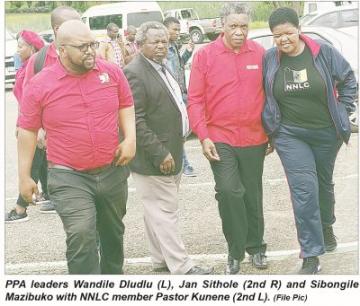PPA LEADERS’ WARRANTS ‘REVIVED’

MBABANE – There is nothing now preventing the police from continuing with the investigations and effecting arrests on the Political Party Assembly (PPA) leaders.
This, after High Court Judge Nkosinathi Maseko yesterday dismissed the urgent application that was filed by the PPA leaders to set aside the search and seizure warrants and detention orders which were issued against them.
The PPA leaders are Ngwane National Liberatory Congress (NNLC) President Sibongile Mazibuko, Chairman of Sibanhle Sinje National Movement Musa Nkambule, PUDEMO Secretary General Wandile Dludlu and President of the Swaziland Democratic Party (SWADEPA), Jan Sithole.
Judge Maseko also ordered that the interim orders he issued to stop the police from proceeding with the arrests on the strength of the warrants they obtained from the Manzini and Mbabane Magistrates Courts in December last year, had lapsed.
When the interim orders were issued, the judge pointed out that he would not stop the police from continuing to retrieve information from the gadgets that were seized from the applicants.
Arrests
The court, however, stopped the police from effecting arrests on the strength of the magistrates’ warrants.
Judge Maseko dismissed the PPA leaders’ application after the court made a finding that they had approached the court prematurely.
This point was raised by Assistant Attorney General Mbuso Simelane, who represented the State in the matter.
Simelane argued that since the warrants were issued at the magistrates court, the quartet ought to have challenged the constitutionality of those warrants before the same court that issued them.
Simelane also submitted that the High Court could not issue a declaratory order against a court order when the application was neither a review nor an appeal.
Thulani Maseko, who represented the PPA leaders, argued that they were properly before court and that the High Court had the jurisdiction to hear their application.
Judge Maseko concurred with Simelane and added that if the PPA leaders were not content with the decisions of the magistrates, they should have taken the matter back to the magistrates court and came to the High Court only on review or appeal.
As a result, Judge Maseko upheld the point raised by the State to the effect that the applicants had prematurely approached the High Court without exhausting local remedies at the magistrates court to set aside the warrants and detention orders.
The court did not proceed to deal with the other points raised by the State, such as that Dludlu and the prime minister had been misjoined and that the application lacked a cause of action in support of a stay against the police to conduct an investigation on a suspected commission of an offence.
Powers
Judge Maseko said magistrates had statutory powers and duties to issue search warrants upon an application made by a police officer on oath. The court said only the magistrates had the powers to issue search warrants and not the High Court.
The judge stated in his judgment that it was only the two magistrates who knew what transpired between them and the police when the search warrants, were applied for.
“It would be extremely irregular and premature for this court to entertain the application to set aside the search warrants which had been issued by the respective magistrates because these are not review proceedings for their actions and decisions in the course of their duty.
“It is difficult how this court is expected to issue a declaratory order as regards the search warrants if the applicants have not firstly launched such proceedings before the magistrates and raised their complaints firstly with them,” said the judge.
The High Court, according to Judge Maseko, could not usurp the statutory rights, duties and functions of the magistrates.
He said the High Court could only entertain proceedings from the quartet in this case only on review in terms of the Rules of the High Court, and on appeal.
“Irrespective of the prayers and the grounds for setting aside the search warrants, the applicants were under legal obligation to approach the magistrates who have the statutory duties and rights to deal specifically with such matters instead of approaching this court as a court of first instance to try and set aside the search warrants.”
Judge Maseko said only the magistrates who issued the warrants knew why they issued such warrants since the records of proceedings were not brought before court to determine the nature of the applicants’ complaints.
The PPA leaders’ complaints, according to the judge, should have been first dealt with by the magistrates and if they were not content with their decisions, they could then institute review or appeal proceedings.
“It is then that this court would be in a position to deal with this matter. It goes without saying that any allegations of unconstitutionality levelled against the magistrates ought to have been raised with them first.
Allegations
“How can this court be expected to deal with such constitutional issues when the subordinate courts that stand accused of having failed to apply their minds when they issued them have not been afforded the opportunity to deal with these matters.”
The magistrates who issued the warrants, according to the judge, ought to have been given the opportunity to deal with the allegations first before approaching the High Court.
Judge Maseko said Section 35(3) of the Constitution clearly provides the direction that the PPA leaders should have instituted the proceedings before the magistrates for cancellation of the warrants and stay of execution of the same warrants.




 del.icio.us
del.icio.us Digg
Digg
Comments (0 posted):